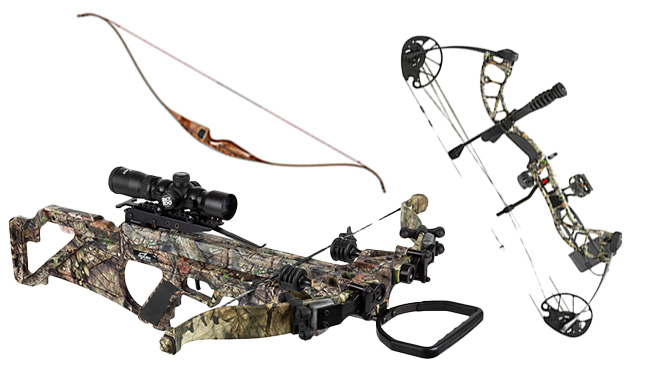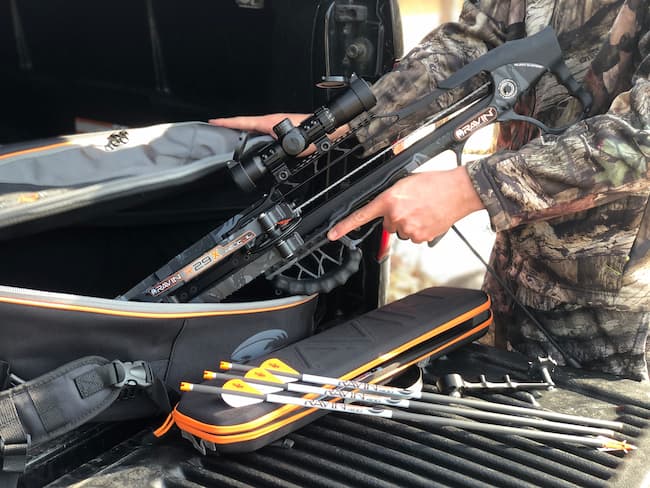
I love this! More decisions to put before you. If you’ve already decided what type of bow you prefer, would you mind sharing with us your preference and a few reasons why that is? Come on, don’t be a jerk, share the sport!
There are many different types of bows, so don’t think for a minute my mind is limited to these few. In this discussion, I’m only covering the most popular three, the Recurve, Compound and Crossbow. Let’s dig up the reasons why an archer would prefer each one, beginning with the Recurve Bow.
I Want That One
If I was in search of a bow that is the easiest to carry and care for, I would opt for the Recurve. It is made up of considerably less material which makes it much lighter and less moving parts and pieces, meaning the least number of parts to break or malfunction. That translates into the least number of parts will require fixing or replacing. Bottom line the Recurve is one of the simplest of the machines. If you’re not a complicated person, then this one might be for you! No need to get offended, it’s perfectly acceptable to be a simple kind of man or woman, does it really matter to you what I think anyway? Let’s get off the subject of you and back onto me.
Back to Me, the Subject
If I was in search of something with more honed in accuracy and power, and that has the ability to stretch out a bit further, one that requires a little less upper body strength, then I would choose a Compound Bow. If this were my choice a couple more advantages to consider would be the ability to customize it, adding more tools, sites, and stabilizers.
If I was in search of a bow that basically does all the real work for me, requires little to no upper body strength, is extremely accurate, producing more energy, a faster flight time and is not at all dependent upon my size or ability, my choice would be a crossbow without question. This choice allows the archer to cock the bow using leg strength, along with little upper body strength or a cocking device. Once the bow is cocked, it requires no strength to keep it in the cocked and ready position, giving me the stealth and concealment necessary for me to spot the game before they spot me. Finally, the archery accessories and customizations are endless.
Have you already decided what type you prefer with that small amount of information? Hold on, this isn’t a marketing ad where they sugar coat the products and their performance, there’s more to talk about here. Let’s dig up reasons why I wouldn’t prefer them, again starting with the Recurve Bow.
Not For Me or You

Am I extremely impatient and want perfect results right now? Do I put a large portion of the responsibility of its performance on the bow? Is my upper body strength or stature inadequate? Do I lack in the stealth department? Am I an extremely paranoid hunter, attempting the least amount of movement in the field as possible? Maybe simple is not for me, I want some customization options. If my answer or yours is yes to these questions, a Recurve is not for you. But why? Stop whining and listen, a recurve is going to require a lot from you.
- Patience to put the time in to practice, accuracy is accomplished by practice.
- Strength to draw and hold that position until the perfect shot placement presents itself.
- You’ll need to be stealthy and concealed; the shot distance is limited.
- To make a shot once you set eyes on your target, movement is required to draw back and position for the release.
- Generally, is not compatible with certain sights, optics and stabilizers.
What about a Compound Bow? Why I wouldn’t choose a compound bow.
- If I’m in search of a lightweight bow that requires the least amount of maintenance, one I can trek into the wilderness with and can assist me in self-sufficiency for long periods of time, I would not choose a Compound Bow.
- If I want to accomplish the least amount of movement in the field, achieving the fastest flight time and the max distance possible in the archery world I wouldn’t choose a Compound Bow.
- If I have size and strength limitations and little to no experience with archery and am not willing to put the time in. If I desire the closest thing to a traditional rifle or long gun in the archery realm, I will not choose the Compound Bow.
Last But Certainly Not Least
Onto the last “Why I wouldn’t”. Why I wouldn’t choose a Crossbow. Some of the reasons are similar to the Compound Bow.
- If I’m in search of a lightweight bow that requires the least amount of maintenance. One I can trek into the wilderness with and can assist me in self-sufficiency. Aiming to keep things simple and as basic as a loin cloth, I wouldn’t choose a Crossbow.
- If I’m not lacking in upper body strength, I don’t mind exerting energy and want to put the amount of time it takes to practice the more demanding options, I wouldn’t choose a Crossbow.
- If I get a thrill when stealth and concealment is the name of the game to accomplish that close quarter harvest, I wouldn’t choose a Crossbow.
What Do You Think?
Still not sure what bow is a good fit for you? Here’s my last suggestion, take this blog to the person that knows you best and ask them to answer the questions I’ve posed for you in your stead, they may know you better than you do. Once you’ve come to a conclusion, don’t forget to tell me.

Where I live, I can’t use a crossbow so compound is the way I have to go. To use a crossbow you have to have a disability and not be able to draw the compound or recurve. I do love shooting the compound and it is a great tool.
Bruce,
Interesting, I wonder what the logic is behind that. I agree the compound is a great tool and they all have their place. I guess where you are the crossbow’s place is in the disabled hands and not yours. Looking on the bright side, I’m glad you’re not disabled and that the disabled have an option.
Keep those arrows flying…
-The Bow Bully-